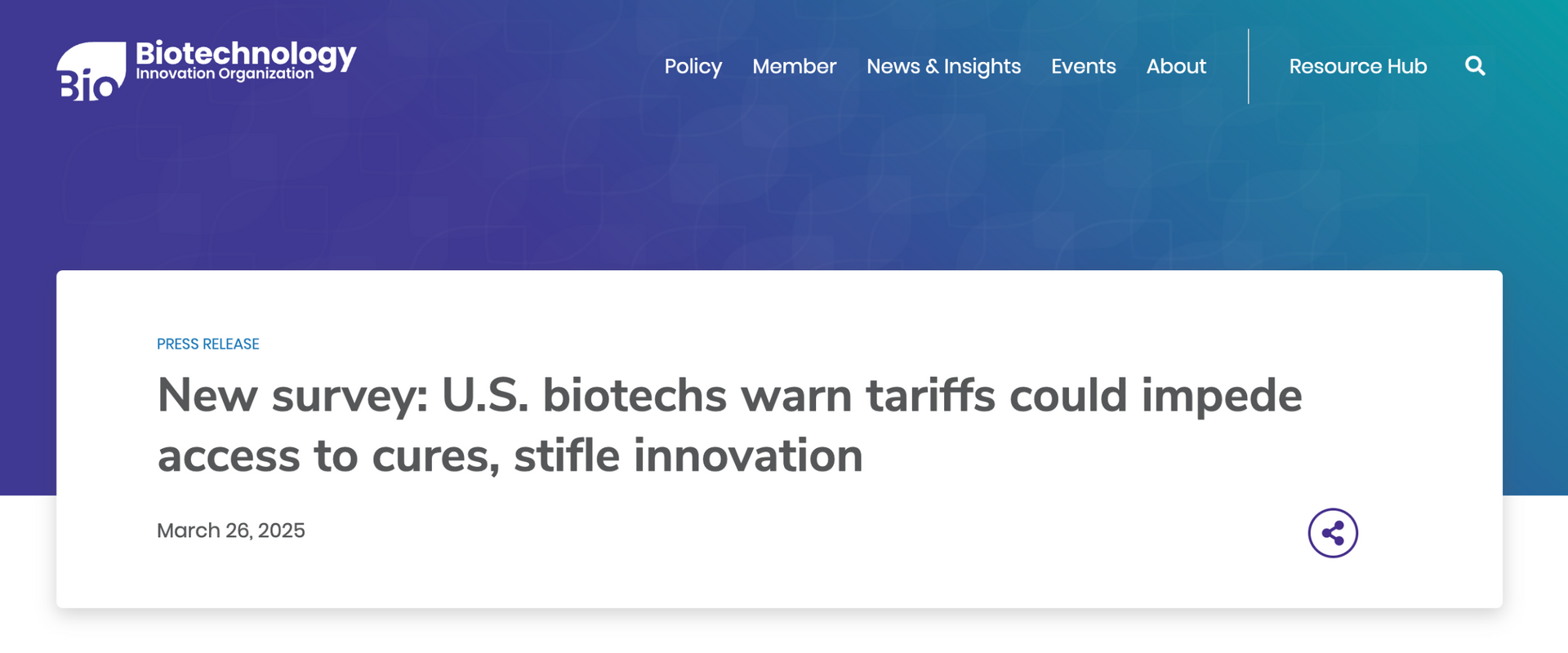NEWS
Stay up-to-date on the latest industry, member, & policy related news.
MichBio members can submit news to be shared here, on our social media, and in our monthly newsletter.

PharmOptima, a Poratge, Michigan-based preclinical contract research organization (CRO) is advancing drug discovery through its comprehensive suite of services. Specializing in in-vivo ADME/PK, ocular research, as well as regulated large and small molecule bioanalytical and ligand binding services, PharmOptima supports clients in optimizing drug development programs efficiently and effectively. With a staff averaging 11 years of industry experience and multiple individuals with advanced degrees, PharmOptima also boasts one of the most capable and engaging teams in the industry. The company collaborates with board-certified veterinary ophthalmologist Dr. Ryan Boyd, further enhancing its ocular research capabilities. PharmOptima's team of experts is dedicated to providing high-quality services to the pharmaceutical biotechnology industries. Looking ahead, PharmOptima scientists will be presenting posters at the 2025 The Association for Research in Vision and Ophthalmology (ARVO) conference, showcasing their latest research and innovations in ocular drug development. For more information visit www.pharmoptima.com .

Two bills, HB 4332 and HB 4333 were recently re-introduced that would prohibit pathogen gain-of-function (GoF) research. Given that the House is now Republican-led raises concerns for MichBio and others that the legislation might gain traction due to misinformation over biosafety and pandemic origins. MichBio opposes such broad legislative bans as they risk undermining critical scientific progress, public health preparedness, and economic innovation. GoF research has been instrumental in developing life-saving therapies and vaccines. For instance, viral vector-based gene therapies, such as Sarepta's Elevidys for Duchenne muscular dystrophy, and oncolytic virotherapies like Amgen's Imlygic for melanoma, rely on genetically modified viruses to deliver therapeutic genes or selectively destroy cancer cells. These advancements stem from GoF methodologies that enhance viral capabilities for therapeutic purposes. Moreover, GoF research has played a pivotal role in vaccine development. Examples like the AstraZeneca and Janssen COVID-19 vaccines and Merck's ERVEBO vaccine against Ebola employs a genetically modified virus to confer protection, underscore the public health benefits derived from GoF studies. Contrary to concerns that GoF research operates without sufficient oversight, multiple layers of regulation are in place. Since 2017, the U.S. Department of Health and Human Services has implemented a framework to evaluate and guide funding decisions for GoF research, particularly those involving potential pandemic pathogens. This framework includes stringent safety protocols, risk assessments, and ethical reviews. MichBio is most concerned that any legislative bans that broadly define and prohibit GoF research risk stifling innovation across various scientific fields. Such bans could inadvertently encompass research in virology, microbiology, molecular biology, and synthetic biology—disciplines vital for developing new therapies, sustainable agricultural practices, and environmental remediation technologies. In turn, state-level bans on GoF research could have detrimental effects on local economies and academic institutions. Such a ban could impede research critical to understanding and combating diseases, leading to a loss of federal and philanthropic funding. This could hamper the growth of the Michigan's biotech and biomedical sectors. MichBio advocates for a balanced approach that reinforces existing oversight mechanisms and fosters transparent, responsible research practices essential to safeguard both public health and scientific progress.

Recent reports have highlighted growing concerns over delays in the U.S. Food and Drug Administration's (FDA) drug review processes, particularly in the context of the Prescription Drug User Fee Act (PDUFA) and Generic Drug User Fee Act (GDUFA) timelines. PDUFA, originally enacted in 1992, allows the FDA to collect fees from pharmaceutical companies to fund the drug review process, with the aim of speeding up access to new therapies. In return, the FDA commits to reviewing new drug applications within specific timeframes—typically 6 to 10 months depending on the type of application. However, as reported by the Wall Street Journal, the FDA has increasingly struggled to keep up with both innovative and follow-on drug reviews, largely due to recent reductions in force (RIFs) and a leadership vacuum at the Center for Drug Evaluation and Research (CDER). Worse yet, other reports indicate that the FDA recently dismissed most of its User Fee negotiators, just as the next PDUFA and GDUFA reauthorization cycles begin. For drug manufacturers, these delays can have significant implications. Missing a PDUFA goal date can lead to lost revenue, delayed market entry, and uncertainty in investor relations. For companies developing treatments for serious or rare diseases, delayed approvals can also stall patient access to potentially life-saving therapies. The FDA has acknowledged these challenges and is actively working on strategies to improve review efficiencies, including better staff recruitment, enhanced use of real-world data, and the modernization of review frameworks. Still, the current delays underscore the importance for manufacturers to anticipate longer timelines and build flexibility into their development and launch strategies. In the broader picture, ensuring timely FDA reviews is critical not only for pharmaceutical companies but also for patients and the overall healthcare system. As such, continued scrutiny and policy refinement by industry groups around the FDA’s review capacity and adherence to PDUFA commitments remain essential.

The National Institutes of Health (NIH) has implemented new grant policies that prohibit funding for researchers and institutions engaged in diversity, equity, inclusion (DEI), or accessibility initiatives. Effective April 21, 2025, this policy applies to all new, renewal, supplement, or continuation awards. The NIH's updated "Civil Rights Term and Condition of Award " overrides previous guidelines, including those aligned with the Civil Rights Act of 1964. Recipients must certify that funds will not "advance or promote" DEI, accessibility, or what the policy describes as "discriminatory equity ideology." Additionally, the policy prohibits participation in boycotts specifically targeting Israeli companies or those doing business with Israel. This policy shift aligns with broader actions by the Trump administration to curtail DEI initiatives across federal agencies. The National Science Foundation (NSF) has similarly indicated plans to terminate awards focused on DEI . Critics argue that these measures threaten academic freedom and hinder efforts to address health disparities among marginalized populations. Legal challenges have emerged in response to these changes. A coalition of scientists and health organizations has filed a lawsuit against the NIH, alleging that the agency unlawfully canceled numerous research grants due to political motivations, particularly those related to diversity and inclusion. The outcome of this litigation may influence the future of federal funding for DEI-related research.

MichBio is proud to partner with Corporate Traveler as our preferred travel management provider , offering members exclusive perks to simplify business travel and drive cost savings. Through our cost savings program, Corporate Traveler provides a high-touch service model backed by intuitive technology, ensuring biotech companies can optimize their travel programs while staying focused on groundbreaking research. Whether you're managing complex itineraries, clinical trials, or essential business travel , Corporate Traveler delivers: Expert travel support with 24/7 assistance Exclusive negotiated rates on airfare, hotels, and rental cars A seamless, easy-to-use booking platform Tailored travel policies to streamline approvals and compliance As a member company, your organization gains access to a customized travel management program with no startup fees —designed to help you travel smarter, reduce costs, and maximize efficiency. Start optimizing your travel program today - www.bio.org/save/corporate-traveler

The Biotechnology Innovation Organization (BIO), of which MichBio is a state affiliate recently released the results of a survey of its members, noting that “U.S. Biotechs Sound the Alarm” on tariff impacts. The findings include: Tariffs on European Union and Canadian imports would increase manufacturing costs for 94% and 82% of biotech firms, respectively. 70% of companies anticipate higher manufacturing costs due to tariffs on China. Tariffs on the European Union would force 50% of biotech firms to identify new research and manufacturing partners. More than 50% of biotech firms predict “increased difficulty” in funding and conducting research if EU tariffs are enacted. 80% of biotech firms would need at least 12 months to find alternative suppliers; 44% would need over two years. The survey noted that sudden tariffs would fundamentally punish American companies, threaten vital research projects and imperil United States leadership in biomedical science. Read BIO’s press release , along with an one-pager summarizing the survey results.

A federal commission, in a new report , is calling for $15 billion in new financing to reinforce the United States’ biotech leadership amid encroaching competition from China. This comes against a backdrop where the Trump Administration has proposed severe cuts to NIH operations and funding. The National Security Commission on Emerging Biotechnology was created by Congress in 2022 to explore how biotechnology advancements could shape the economy and national security. The body quickly focused on China, as that government has gone about gathering Americans’ genetic information and intellectual property in the biotech space and resourcing their cluster’s rapid growth. The report’s 49 recommendations, organized across six strategic pillars, offer a bold and actionable framework to protect U.S. biotech intellectual property and bolster drug development, agriculture, and biological weapons defense: Prioritize biotechnology at the national level Mobilize the private sector to get U.S. products to scale Maximize the benefits of biotechnology for defense Out-innovate our strategic competitors Build the biotechnology workforce of the future Mobilize the collective strengths of our allies and partners The report calls for $1 billion to create an investment fund, more than $6 billion for large-scale research challenges, and a build-up of biomanufacturing sites across the country. Also, it calls for new legislation barring companies that work with U.S. national security agencies or health agencies from using certain Chinese biotech suppliers. The commission doesn’t have the power to authorize any changes but can make recommendations and advise members of Congress. BIO issued a statement in support.

According to the Science and Community Impact Mapping Project (SCIMaP), proposed NIH funding cuts could lead to $16 billion in economic loss and 68,000 lost jobs nationwide. The interactive map provides a breakdown of the effects proposed cuts could have at a national, state and county level. The projected losses are modeled by applying a multiplier effect based on a recent finding that each dollar invested by the NIH generated $2.56 in new economic activity in 2024. Job loss estimates are tied to the average number of positions supported per dollar of NIH research spending in 2024. Geographic estimates incorporate census data on where people live and work to capture spillover effects across county lines. Data reveals that Michigan stands to lose $460 million in economic impact and 1,988 jobs. This includes losses of $217 million in Washtenaw County, $73 million in Wayne County, $36 million in Ingham County, $23 million in Oakland County, $17 million in Kent County, and lesser, but still significant amounts in Clinton, Eaton, Genessee, Houghton, Jackson, Kalamazoo, Lenawee, Livingston, Macomb, Monroe, Ottawa and Shiawassee counties.



